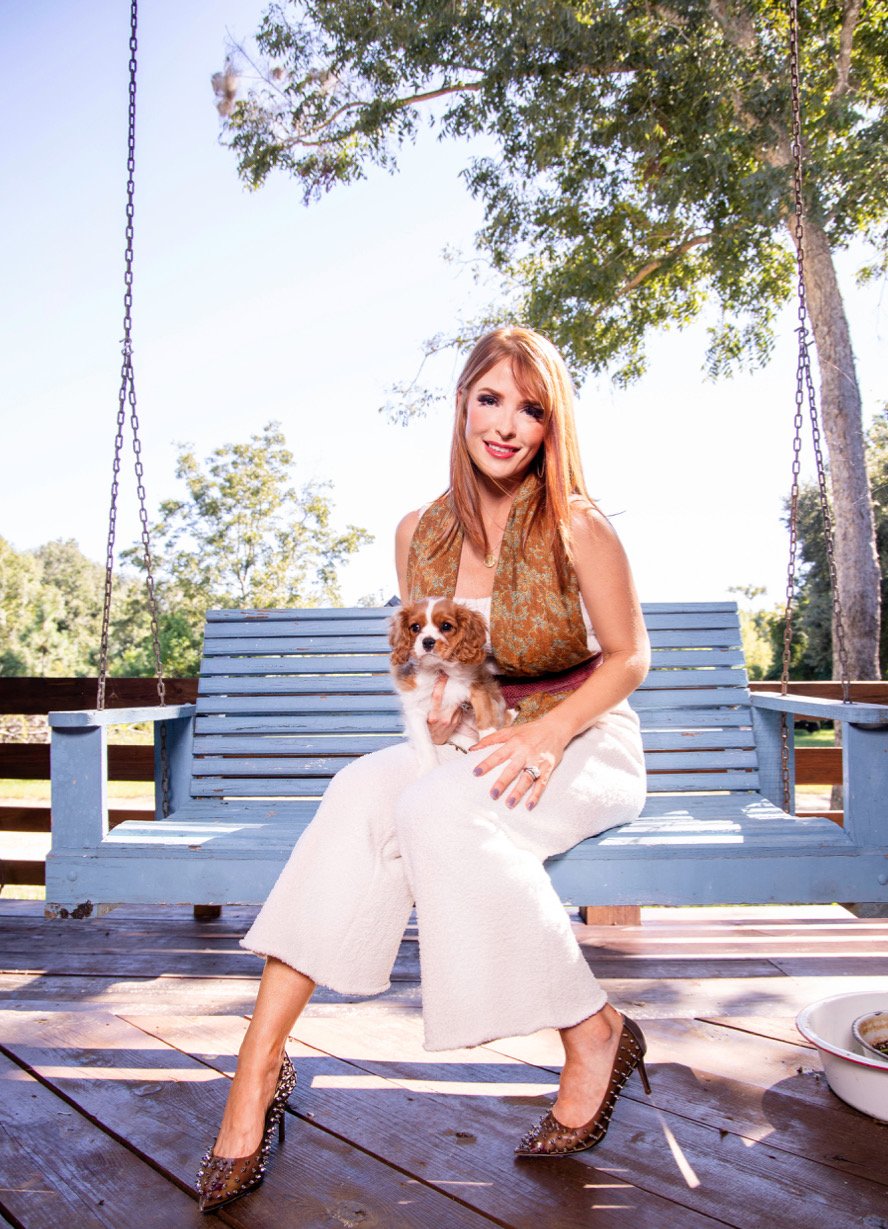EATING DISORDERS: FROM PATIENT TO PRACTITIONER
words by Amber Wielkins; photography by Stevye Murray
Suzanne Glass, M.A., ALC, knows looks can be deceiving. Anyone seeking help for body dysmorphia and eating disorders (ED) might think she couldn’t possibly understand. They’d be wrong. Having struggled with these life-changing illnesses, she opens up about her own journey, as she is now highly qualified and dedicated to helping others because she understands exactly how they feel.
“My personal struggle with food and eating disorders began in my early teens, and it was a difficult journey lasting
almost 13 years. As a kid, I always
stood out, which I hated. I was taller than all the boys, red-headed, pale and freckled, and shaped like a Coca-Cola can, not a bottle”
Desperately wanting to fit inand look like the other girls in her school, she found herself constantly comparing and always feeling less than. “I was a top student, an accomplished pianist, an avid equestrian, and had plenty of friends —by all outward appearances, I lived a happy, well-adjusted life,” she says.
But inwardly, she was miserable in her own skin and embarked on a trail of self-abuse.She says, “I vividly remember the first time I purged and the complicated feelings I had, thinking, ‘This is so easy; I can eat what I want and not have to worry about gaining weight.’ As a young teenage girl, I couldn’t have predicted how quickly it would escalate and take total control of my life, the destruction it would cause in my personal relationships, or the havoc it would wreak on my body and mind.
What began as purging quickly evolved into extreme caloric restriction, bulimia, excessive exercising, calorie counting, and abusing diet pills. “In college, I began seeing a therapist and nutritionist asan outpatient. Unlike other therapists, she,too,had suffered from an EDand was passionate about utilizing her past to help others,” Suzanne shares. Feeling heard and understood for the first time, she felt hope she could overcome her own ED, yet she wasn’t ready to part with the behaviors and beliefs holding her captive. After a short stint in recovery, she relapsed after graduating.
Now completely controlled by her illness, Suzanne determined her self-worth by numbers on the scale and the size she wore. Despite many attempts by concerned family and friends trying to help, her relationship with her disorder was what she clung to most and she protected it at all costs. Again, Suzanne would promise them and herself she could stop, which would just force her to hide the relationship and protect it even more.
“There is hope and a new life in
recovery, and it’s possible for each of us when we are ready to confront it”
Now a licensed counselor at Collins Counseling & Associates, P.C., Suzanne’s passion for helping others is evident. “I specialize in the areas of women’s issues, eating disorders, body image, self-esteem, anxiety, and depression,” she details, adding that she works with individuals, couples, and families to address other relationship issues like grief, conflict resolution, and divorce.
Maybe there’s someone you’re worried might have an ED. Suzanne explains it’s difficult to detect them on the surface. Our culture promotes excessive exercise, fad diets, and avoidance of certain food groups, so what’s seen as normal behavior can mask a deadly eating disorder. Then there are the stereotypes. “We’ve come to believe EDs only happen to the affluent and thin, but eating disorders are found in all ages, ethnicities, genders, sizes, and socioeconomic statuses,” Suzanne details. “This means the emaciated client and the client considered overweight can share the same criteria for certain EDs.”
Things to be on the lookout for are poor body image, preoccupation with weight, frequent dieting, excessive exercising, frequent trips to the bathroom after meals, purging, binging, and avoidance of eating. Suzanne shares, “It’s not uncommon for a loved one to deny an ED when confronted, but parents and loved ones should pay attention to how these behaviors are impacting that person’s life. Are they having trouble concentrating, poor performance at school, withdrawing from friends, or distancing themselves from family members? The nature of EDs is extreme secrecy and protection for the sufferer. Loved ones and family shouldn’t ignore the signs.”
Sharing this incredibly intimate story isn’t easy for Suzanne, but she wants people to understand how eating disorders can ruin every facet of a person’s life, but that despite it all,there is hope. “At the lowest point of my ED, I felt complete hopelessness,” she shares. “My entire identity and future were ina relationship with a monster that was consuming me each day,” The therapistsand staff sheencounteredwhile in treatment inspired her to pay it forward. “My hope is to be that source to others in my community, not only through my personal battles, but alsowith the education and appropriate training to help in the greatest way possible.”
If you or a loved one need help battling an ED, connect with Collins Counseling & Associates at one of their three convenient locations:
1340 Sledge Drive Mobile, AL22765
U.S.Hwy.98 Fairhope, AL
301 Main StreetAtmore, AP.C.
This post as been edited for length. Read the full article in the November issue of ACCESS magazine.









